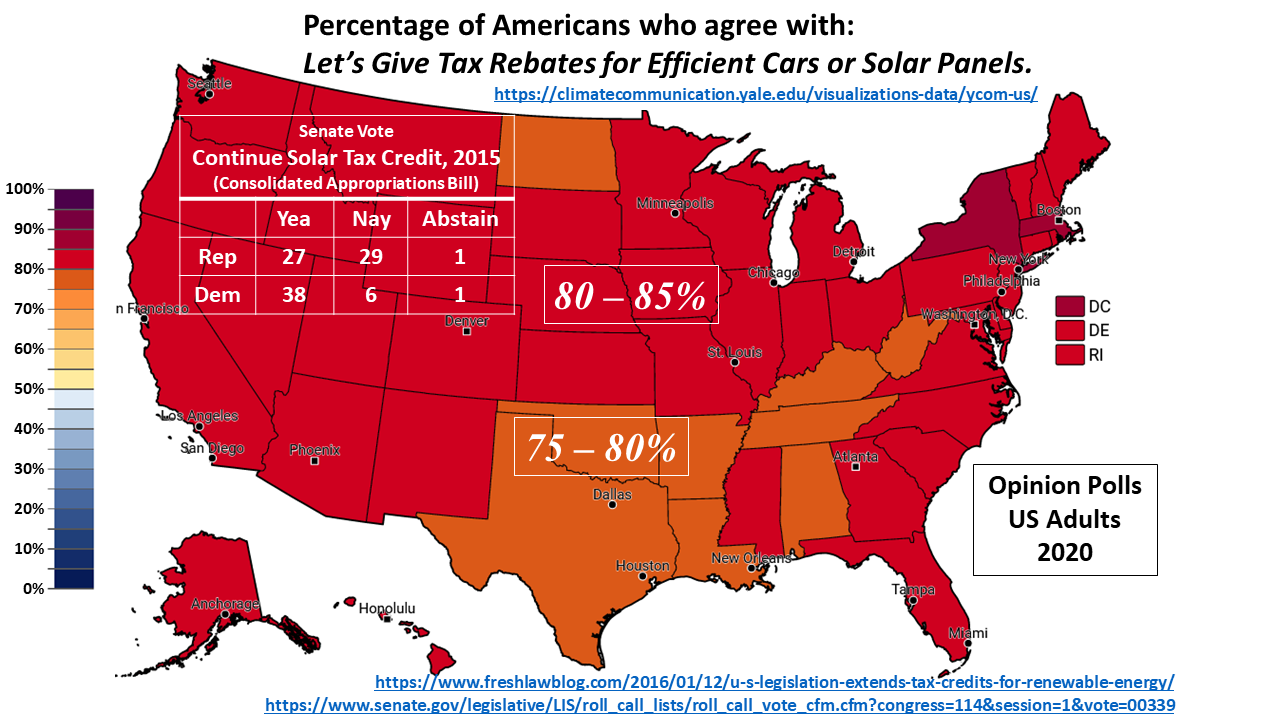
Republican Representation Gap: Clean Energy Edition
1. Today
It’s not surprising that large majorities of people in California, Massachusetts, and New York believe that the government should “regulate CO2 as a pollutant”. But Texas, Nebraska, Florida, and North Carolina? Over 75% of people polled there agreed [1]. Still, every single senator from these states, all Republicans, voted against a bill to restore cost-effective limits on accidental emissions of heat-trapping gases.

The Environmental Protection Agency (EPA) introduced these limits in 2016 after scientists realized that large quantities of methane were leaking out of pipelines and other facilities. Methane is the familiar “natural gas” used for heating and electricity generation. Each molecule absorbs twenty five times as much infrared light as a molecule of carbon dioxide (CO2), and so releasing a small amount into the atmosphere traps a relatively large amount of heat. The EPA estimated that repairing leaks would actually recover enough methane to pay for the repairs [2].
Unfortunately, the Trump administration wanted to defend the freedom to pollute the atmosphere no matter how harmful the problem or how cost-effective the cure [3]. In 2020 it enacted new rules to weaken controls on methane. The change was made over the objections of fossil fuel giants Shell, BP and Exxon Mobil. The companies worried that allowing some operators to let methane leak would be bad publicity for the entire natural gas industry.
Senate Joint Resolution 14 to restore the original EPA rule was passed 52-42 with 6 members not voting [4]. All the Nays and 5 of those not voting were Republicans; the Yeas included 49 Democrats and 3 Republicans: Susan Collins (ME), Lindsey Graham (SC), and Rob Portman (OH). I’m not aware of any state-by-state polls of opinion on methane release, but most likely support for regulation against unnecessary waste of gas would be even greater than for CO2.
Support for CO2 regulation was weakest in states with conservative voters and a large fossil fuel industry such as Oklahoma and West Virginia, and strongest in liberal states. But it is striking how small the range is. 44 out of the 50 states had majorities of 70-80% in favor of regulation. Apparently that didn’t matter to Republican Senators like Burr and Tillis in NC or Rubio and Scott in FL.
2. Yesterday
The same pattern has played out over and over in the past. As the map below shows, overwhelming majorities support tax rebates for energy-efficient cars or for solar power. It turns out that Senate Republicans don’t love all tax breaks; ones that would help people capture energy from clean sunshine was opposed by over half of them in 2015, when Congress voted to extend a tax break for solar panels. Democratic leaders even agreed to removing a long-standing ban on exporting oil (which is probably why 6 out of 44 Democrats voted against it), but that still wasn’t enough to convince 29 Republicans [5].

3. Tomorrow
Will the same pattern continue into the future? The website Five Thirty Eight has compiled polling results for President Biden’s infrastructure proposal, the American Jobs Plan. A minority of the country, about 40%, opposes the plan, and 50-60% support it [6].

But an interesting thing about Americans is that many who reject government programs in the abstract embrace them when given specifics. Thus overwhelming majorities like spending on roads and bridges and water pipes, but majorities also like more green infrastructure initiatives like trains and electric car charging stations.
Even supposedly controversial items, like spending on childcare or community college, have strong majorities. None of the categories have majorities against.


Well, maybe the problem isn’t the spending, but having to pay for the spending.
Polls show that isn’t true either. Even the Fox News poll shows majorities favoring tax increases on high income households or corporate profits.

Newspapers talk of “blue states” and “red states,” but when it comes to government taking action to modernize the foundations of our technological civilization, the public across the country is more unified than it may look on Capitol Hill. Perhaps Congress members who disregard their constituents’ desire for clean air and modern roads, rails, and electrical grids should be hearing from the people of their states.
[1] Yale Climate Opinion Maps 2020, https://climatecommunication.yale.edu/visualizations-data/ycom-us/
[2] https://www.nytimes.com/2016/05/13/us/obama-methane-epa.html
[3] https://www.npr.org/2021/04/28/991635101/senate-votes-to-restore-regulations-on-climate-warming-methane-emissions. The bill must also be passed by the House of Representatives and signed by the President; both are expected to happen.
[5] https://www.freshlawblog.com/2016/01/12/u-s-legislation-extends-tax-credits-for-renewable-energy/ and https://www.senate.gov/legislative/LIS/roll_call_lists/roll_call_vote_cfm.cfm?congress=114&session=1&vote=00339